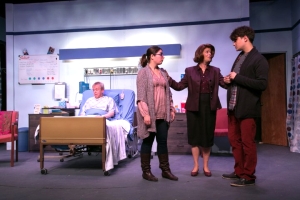Man, am I slugging along through the end of the A to Z Challenge. I have already missed the official deadline by 17 days but I promised myself that I would at least finish the challenge, even if within my own time. The end is so near I can taste it. In all honesty, I was struggling to find a good “X” word. Xanax was too boring and cliché, xenophiilia/xenophobia was too pretentious and Xanadu was an easy way out, not to mention my friend’s “X” word.
Then it hit me: xfinity.
I supposed xfinity isn’t really a word so much as it is a brand but I have to tell you, it has saved my life. It has been 9 days since I had minor foot surgery and I have been instructed to stay off my feet as much as possible. So I’ve been watching a lot of xfinity (and Netflix and Amazon and regular ol’ cable TV).
With the help of streaming, I’ve caught up on all of my favorite shows that are currently airing or wrapping up their seasons. In the past few days I’ve seen the finales of four shows. There was some good TV going on in the last couple weeks and I thought I’d share my “nutshell” reactions.
[WARNING: Spoilers Ahead.]
The Good Wife. Unlike the surprise of Derek’s departure from Grey’s, we knew that Kalinda was leaving the show. The finale gave Kalinda’s storyline a little more closure. Much like Grey’s Anatomy, Season 6 of The Good Wife left a pretty open playing field for Season 7. It was no surprise that Louis Canning will continue to figure into Alicia’s legal career and it remains to be seen how Finn figures into Alicia’s life, both personally and professionally. It will be interesting to see Alicia, Louis and Finn going head to head with Cary, Diane and David next year.
Bates Motel. So this is the season where Norman really starts to lose it and his split personality with Norma starts becoming more prominent. The season finale was decent. Nothing really jaw dropping. The show had a few dramatic turns that could develop into something compelling next year. No confirmation has come from A&E as to whether or not they are picking Bates up for Season 4. I would like to see it go at least one more season so we can see Norman really coming unhinged, which is when Freddie Highmore is at his best.
Grey’s Anatomy. I have to say that Shonda doesn’t deliver Grey’s season finales like she used to. All in all this was basically a “cleaning up house” kind of finale, giving her a fairly clean slate to start with next season. Following Derek’s death, she raced through an entire year in one episode so she could get us quickly to new conflicts and challenges for the Grey Sloan Memorial gang. It’s been renewed for Season 12, so I’ll keep watching. Natch.
Scandal. Okay. Scandal was the finale the elicited the most gasps from me when I was watching it, making up for some of the ridiculous stuff we endured this season. Papa Pope is truly the hell, the high water and more. I love how evil he is. There were a couple good cliffhangers that should ensure that Season 5 will start with a roar and not a whimper. The fate of Huck and Jake (I refuse to believe we’ve seen the last of him) should prove to be very exciting next season. Fitz finally grew a pair and shook things up at the White House. Also, he got the girl. But the question is for how long?
BONUS: Wrapping Up Tomorrow Night, Forever
The Following. The recent cancellation of the Fox series saddens me a bit but I have to say that it has lost a little of the sizzle it once had. The recipe is the same, the players just get changed up a bit. I think the series suffered when they lost Joe Carroll as a primary character. While Theo is certainly a formidable opponent, I don’t see him bonding with Ryan Hardy in the same way Joe did/does. The season, and now series, finale is tomorrow. The producers are apparently shopping different networks but if they don’t find a home, I hope tomorrow night’s episode gives us a somewhat tidy ending.
* My doctor said I’m healing because I’m calm and compliant. I don’t freak out and I do what I’m told.

















